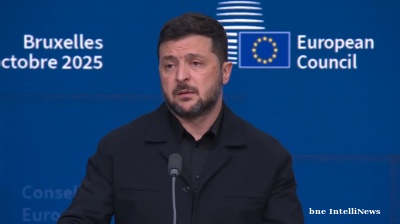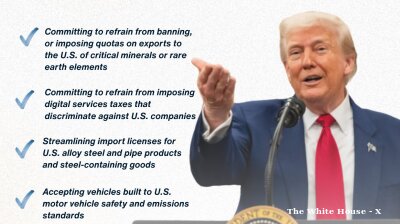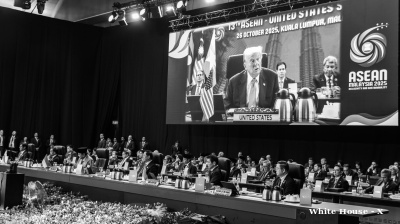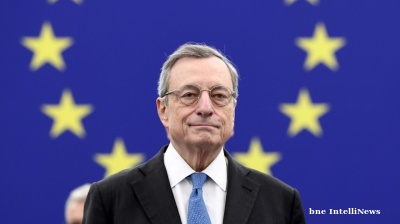Bulgaria’s parliament on October 24 passed new legislation tightening state control over the sale of Russian oil major Lukoil’s assets in the country, a day after Washington imposed fresh sanctions on Russia’s top energy firms over the war in Ukraine.
The move follows new US sanctions announced by President Donald Trump on October 22 targeting Lukoil and Rosneft — Moscow’s two largest oil exporters — for continuing to finance Russia’s military campaign.
Under amendments to Bulgaria’s Investment Promotion Act, any transaction involving Lukoil’s Bulgarian subsidiaries — including the country’s biggest oil refinery in Burgas — will now require prior approval from the State Agency for National Security (SANS) and the Council of Ministers.
Prime Minister Rosen Zhelyazkov said on October 23 that the government must decide within a month how to proceed with the Burgas refinery, which supplies much of Bulgaria’s fuel and is considered vital for national security.
After an emergency cabinet meeting on October 24, Energy Minister Zhecho Stankov said Sofia had a “clear action plan” to ensure stable fuel supplies and that domestic consumption was “fully secured through the end of the year,” BTA reported.
“The key message today is that Bulgarian citizens should remain calm,” Stankov told reporters at a news briefing. “Fuel for domestic consumption is guaranteed, and the state will act in coordination with our European partners.”
He said the government would monitor fuel reserves, work with industry representatives to prevent shortages or price spikes and coordinate with the European Commission on contingency planning.
Political row over new law
The legislation sparked a heated debate in parliament, with opposition lawmakers accusing the ruling GERB coalition and its ally, Delyan Peevski’s Movement for Rights and Freedoms – New Beginning, of using the sanctions crisis to expand political control over key energy assets.
Radoslav Ribarski of Change Continues – Democratic Bulgaria said the law grants excessive powers to SANS, BTA reported. Ivaylo Mirchev of Yes, Bulgaria argued that existing mechanisms for screening foreign investments already allow state oversight of major transactions.
Supporters countered that the new framework is necessary to protect national security and ensure compliance with Western sanctions.
Lukoil’s uncertain future
Bulgaria has been trying to sell its Lukoil subsidiaries since late 2023 amid growing sanctions pressure. Its assets include over 200 petrol stations, a transport and storage network and aviation fuel subsidiaries.
Talks have involved a consortium between Azerbaijan’s state-owned energy company SOCAR and Turkey’s Cengiz Holding, though diplomatic tensions between Moscow and Baku have slowed progress. Other potential bidders included Kazakhstan’s KazMunayGas, backed by trader Vitol, and Hungary’s MOL.
Some market analysts say a sale remains unlikely, as Lukoil’s operations in Bulgaria are strategic to its regional business. Some expect Bulgaria to follow Serbia’s example, where a Russian oil firm under US sanctions continues to operate.
Justice Minister Georgi Georgiev said security services have increased monitoring at the Burgas refinery, calling it “a strategic site for national security,” BTA reported. He urged calm, adding that Sofia is coordinating closely with the European Union.
“Bulgaria is not alone,” Georgiev said. “We are working with our European partners to navigate this new reality.”
News

Milei celebrates resounding victory in Argentina's midterm elections
Argentine President Javier Milei scored a major win for his La Libertad Avanza (LLA) party in Argentina's October 26 midterm legislative elections, as the party obtained approximately 40.84% of the nationwide vote with 99.14% of the votes counted.

Zelenskiy accuses China of aiding Russia’s war effort through industrial and military support
Ukrainian President Volodymyr Zelenskiy accused China of materially supporting Russia’s military-industrial complex, providing key technologies and resources that have enabled Moscow to sustain and scale its war effort against Ukraine.

US Treasury Secretary Bessent blasts “Russian propagandist” special envoy Dmitriev in Washington PR debacle
A trip to Washington by the Kremlin’s special business envoy Kirill Dmitriev days after the US imposed new oil sanctions turned into a debacle after US Treasury Secretary Scott Bessent blasted him as a “Russian propagandist.”

Trump pledges enduring support for Southeast Asia as new trade deals signed
During his visit to Southeast Asia, US President Donald Trump declared that Washington would remain a steadfast ally to the region, as he signed a series of trade agreements with four ASEAN member states.




